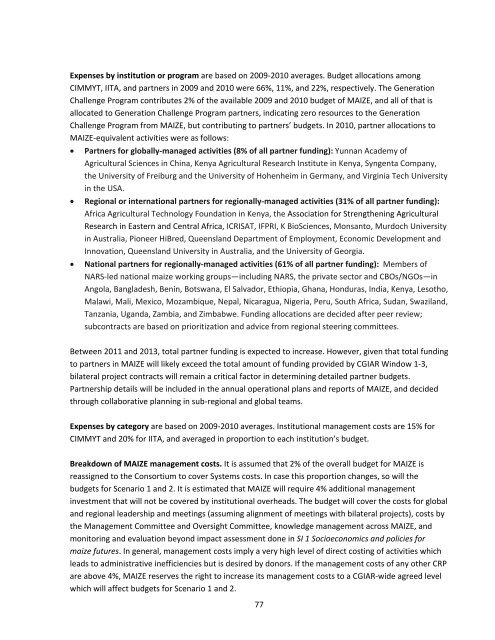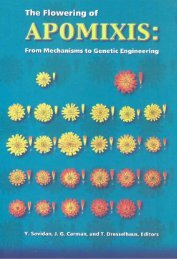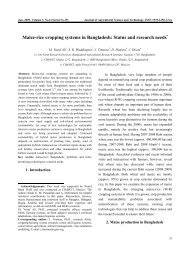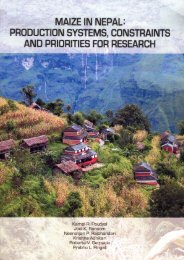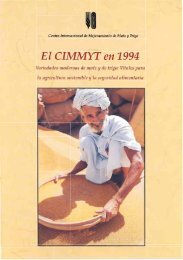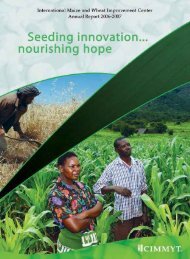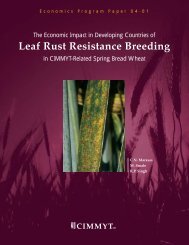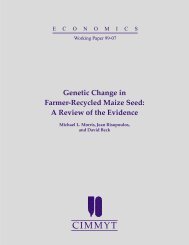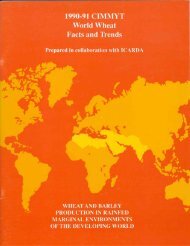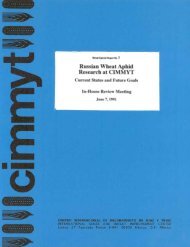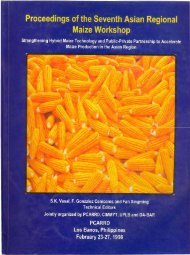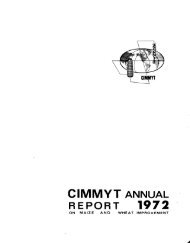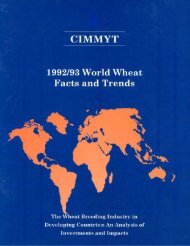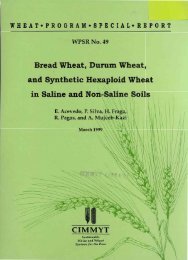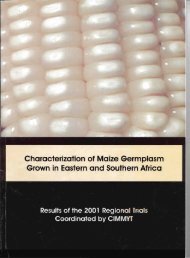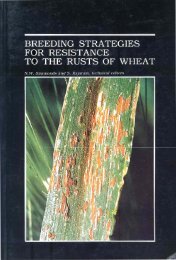Download - Maize
Download - Maize
Download - Maize
You also want an ePaper? Increase the reach of your titles
YUMPU automatically turns print PDFs into web optimized ePapers that Google loves.
Expenses by institution or program are based on 2009‐2010 averages. Budget allocations among<br />
CIMMYT, IITA, and partners in 2009 and 2010 were 66%, 11%, and 22%, respectively. The Generation<br />
Challenge Program contributes 2% of the available 2009 and 2010 budget of MAIZE, and all of that is<br />
allocated to Generation Challenge Program partners, indicating zero resources to the Generation<br />
Challenge Program from MAIZE, but contributing to partners’ budgets. In 2010, partner allocations to<br />
MAIZE‐equivalent activities were as follows:<br />
<br />
<br />
<br />
Partners for globally‐managed activities (8% of all partner funding): Yunnan Academy of<br />
Agricultural Sciences in China, Kenya Agricultural Research Institute in Kenya, Syngenta Company,<br />
the University of Freiburg and the University of Hohenheim in Germany, and Virginia Tech University<br />
in the USA.<br />
Regional or international partners for regionally‐managed activities (31% of all partner funding):<br />
Africa Agricultural Technology Foundation in Kenya, the Association for Strengthening Agricultural<br />
Research in Eastern and Central Africa, ICRISAT, IFPRI, K BioSciences, Monsanto, Murdoch University<br />
in Australia, Pioneer HiBred, Queensland Department of Employment, Economic Development and<br />
Innovation, Queensland University in Australia, and the University of Georgia.<br />
National partners for regionally‐managed activities (61% of all partner funding): Members of<br />
NARS‐led national maize working groups—including NARS, the private sector and CBOs/NGOs—in<br />
Angola, Bangladesh, Benin, Botswana, El Salvador, Ethiopia, Ghana, Honduras, India, Kenya, Lesotho,<br />
Malawi, Mali, Mexico, Mozambique, Nepal, Nicaragua, Nigeria, Peru, South Africa, Sudan, Swaziland,<br />
Tanzania, Uganda, Zambia, and Zimbabwe. Funding allocations are decided after peer review;<br />
subcontracts are based on prioritization and advice from regional steering committees.<br />
Between 2011 and 2013, total partner funding is expected to increase. However, given that total funding<br />
to partners in MAIZE will likely exceed the total amount of funding provided by CGIAR Window 1‐3,<br />
bilateral project contracts will remain a critical factor in determining detailed partner budgets.<br />
Partnership details will be included in the annual operational plans and reports of MAIZE, and decided<br />
through collaborative planning in sub‐regional and global teams.<br />
Expenses by category are based on 2009‐2010 averages. Institutional management costs are 15% for<br />
CIMMYT and 20% for IITA, and averaged in proportion to each institution’s budget.<br />
Breakdown of MAIZE management costs. It is assumed that 2% of the overall budget for MAIZE is<br />
reassigned to the Consortium to cover Systems costs. In case this proportion changes, so will the<br />
budgets for Scenario 1 and 2. It is estimated that MAIZE will require 4% additional management<br />
investment that will not be covered by institutional overheads. The budget will cover the costs for global<br />
and regional leadership and meetings (assuming alignment of meetings with bilateral projects), costs by<br />
the Management Committee and Oversight Committee, knowledge management across MAIZE, and<br />
monitoring and evaluation beyond impact assessment done in SI 1 Socioeconomics and policies for<br />
maize futures. In general, management costs imply a very high level of direct costing of activities which<br />
leads to administrative inefficiencies but is desired by donors. If the management costs of any other CRP<br />
are above 4%, MAIZE reserves the right to increase its management costs to a CGIAR‐wide agreed level<br />
which will affect budgets for Scenario 1 and 2.<br />
77


